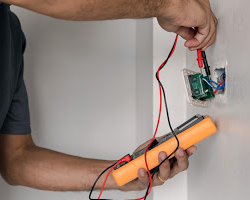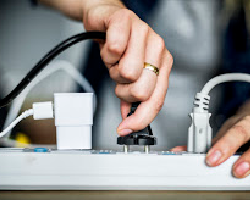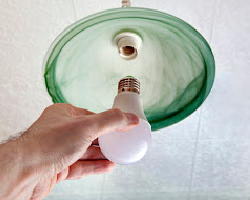A pinch of prevention is worth a pound of cure, as the old saying goes. This is never more true than in preventing electrical fires in your home. It’s estimated that electrical failures or malfunctions account for 13% of all household fires. Attics, living rooms, and kitchens experience electrical home fires most often, but don’t overlook other hazards like a clothes dryer fire.
It is, therefore, vital to observe as many electrical safety tips as possible. We’ve compiled a list of six tips for preventing the most common causes of electrical fires on your property.
1. Have Your Wiring Inspected
 Like any other component of your home, your electrical wiring is prone to wear and tear and aging.
Like any other component of your home, your electrical wiring is prone to wear and tear and aging.
If your home is ten years or more old, it is good to check on its health and potential problems.
Hire an electrician to inspect the condition of your wiring. They will provide you with a report on its state and recommend needed repairs or rewiring.
2. Don’t Overload Your Electrical Outlet
 Power strips and extension cords are a great way to get more electrical outlets from a single socket, but just because they come with four or six outlets doesn’t mean you should use them all.
Power strips and extension cords are a great way to get more electrical outlets from a single socket, but just because they come with four or six outlets doesn’t mean you should use them all.
Your electrical outlet carries a certain amount of electricity. By plugging multiple appliances into a power strip, you risk overloading the outlet and causing a fire.
To avoid this potential fire risk, space your appliances by only using every second outlet on your power board and avoid filling all the outlets with high-powered devices.
3. Install Surge Protectors
As the name suggests, a surge protector guards your appliances, or anything else plugged into your outlet from sudden and unexpected electrical surges.
A power surge can increase the amount of electricity flowing into your electrical outlet and overload it. This can cause your appliance to spark, starting an electrical fire.
4. Regularly Check the Plugs on All Your Electrical Appliances
Wiring isn’t the only thing in your home that can become damaged or worn out. The plugs on your appliances can become cracked or otherwise damaged.
A faulty plug is likely to cause an electrical shock when used or it will overheat. Replace any damaged plugs or replace the appliance altogether.
5. Always Use the Recommended Wattage in Light Fixtures
 Never exceed the recommended wattage for light fixtures and lamps. A 100-watt globe installed into a fixture with a maximum 60-watt capacity can cause a house fire.
Never exceed the recommended wattage for light fixtures and lamps. A 100-watt globe installed into a fixture with a maximum 60-watt capacity can cause a house fire.
Although they may look pretty, never decorate lampshades with paper, cloth, or other flammable material.
Always avoid using extension cords for lighting. When you notice that your lights flicker or won’t stay on and you have ruled out any problems with the switch, replace the light fixture.
6. Position Portable Heaters Correctly
Portable heaters that use coils or bars to heat are a potential fire danger. Always position these types of heaters away from flammable materials such as drapes and blankets.
Never use these appliances for drying clothes. Water or moisture from the clothing could fall onto the heater, causing sparking, which could lead to a fire.
By following these tips and remaining vigilant, you will reduce the likelihood of an electrical fire at your home.
If you’ve already experienced fire damage, contact ATH for fire restoration services. We offer 24/7 emergency response and work with your insurance company to coordinate your claim and mitigate damages. Browse our Fire Damage FAQs to learn more.
Related:
Smart Home Devices to Help Prevent Fire and Water Damage Disasters
What Can Be Salvaged After a House Fire?
